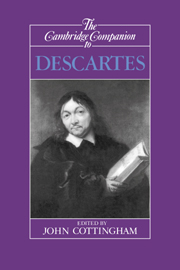Book contents
- Frontmatter
- Introduction
- 1 Descartes' life and the development of his philosophy
- 2 Descartes and scholasticism
- 3 The nature of abstract reasoning
- 4 Cartesian metaphysics and the role of the simple natures
- 5 The Cogito and its importance
- 6 The idea of God and the proofs of his existence
- 7 The Cartesian circle
- 8 Cartesian dualism
- 9 Descartes' philosophy of science and the scientific revolution
- 10 Descartes' physics
- 11 Descartes' physiology and its relation to his psychology
- 12 Descartes on thinking with the body
- 13 The reception of Descartes' philosophy
- Bibliography
- Index
Introduction
Published online by Cambridge University Press: 28 May 2006
- Frontmatter
- Introduction
- 1 Descartes' life and the development of his philosophy
- 2 Descartes and scholasticism
- 3 The nature of abstract reasoning
- 4 Cartesian metaphysics and the role of the simple natures
- 5 The Cogito and its importance
- 6 The idea of God and the proofs of his existence
- 7 The Cartesian circle
- 8 Cartesian dualism
- 9 Descartes' philosophy of science and the scientific revolution
- 10 Descartes' physics
- 11 Descartes' physiology and its relation to his psychology
- 12 Descartes on thinking with the body
- 13 The reception of Descartes' philosophy
- Bibliography
- Index
Summary
Descartes is perhaps the most widely studied of all the great philosophers. Students in countless introductory courses find that their imagination is captured by the lonely quest for knowledge described in Descartes' masterpiece, the Meditations on First Philosophy. The radical critique of preconceived opinions or prejudices (praejudicia) which begins that work seems to symbolize the very essence of philosophical inquiry. And the task of finding secure foundations for human knowledge, a reliable basis for science and ethics, encapsulates, for many, what makes philosophy worth doing. The excitement felt on first encountering Cartesian philosophy does not diminish as one delves deeper. Descartes' inquiries into the nature and structure of the material universe, his views on human freedom and the existence of God, and his account of the human condition and the relationship between mind and matter, all exert a powerful intellectual pull on us even today. And even when the details of the system are forgotten, Descartes' starting point in the quest for truth, his Cogito ergo sum (“I am thinking, therefore I exist ”) remains the most celebrated philosophical dictum of all time.
- Type
- Chapter
- Information
- The Cambridge Companion to Descartes , pp. 1 - 20Publisher: Cambridge University PressPrint publication year: 1992
- 2
- Cited by



